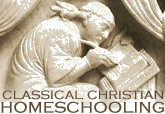

| Text Only (Printer-Friendly)
Classical Christian WebMaster: Classical Christian www.clas...ling.org/faq/kindergarten.html This page last revised: Copyright |
Teaching KindergartenChristine Miller Remember that kindergarten is not technically necessary. The origin of kindergarten lies with the Prussian model of schooling, admired by Horace Mann et al, and was instituted to remove children from the influence of their parents at an earlier age. (Please read The Public School Nightmare by John Taylor Gatto for more information on the history and development of our current public and private school structure.) However, if children of kindergarten age in a homeschool setting are eager to “do school” like big brother or sister, these suggestions will enrich their hearts and minds while providing important practice in fine motor coordination and development. The Importance of ReadingReading is the first and most important skill to all of education, and classical education is no exception. Before your child learns to read on his own, be sure to read to him daily and consistently. The more he is read to, the better. Read the Bible, and a wide variety of other materials, anything worthwhile, beautiful, and edifying. Poetry is especially wonderful. I highly recommend that everyone read a copy of Honey for a Child’s Heart by Gladys Hunt for an excellent look at the importance and benefits of reading, books, and literature in a child’s life. As far as what to read to your child, the CE Support Loop has spent much time compiling the 1000 Good Books List. Be sure to read Reading and Literature as well as the admonition to parents in the introduction to the list. Teaching your child to read at this point is not necessary, unless he is ready for it. If he is ready to learn to read, use a phonics-based program, such as one recommended in Classical Christian Curriculum. Additional AcademicsThe Three R’s by Ruth Beechick is a balanced guideline for an effective but gentle introduction into academic studies for kindergarteners. This series includes: A Home Start in Reading, An Easy Start in Arithmetic, and A Strong Start in Language. These little books will tell you what you need to know so that you can recognize reading readiness and become familiar with a child’s natural progression of learning in reading, writing, and arithmetic. I also believe Barry Stebbing’s art books for young children are perfect for kindergarten. The Baby Lamb’s Book of Art, for preschoolers, and I Can Do All Things, for kindergarteners and up, gives children practice in handling pencils, crayons, paint and markers; and cut and paste. This practice is important because many children are still developing the fine motor coordination needed for more advanced work later on with pencil and paper. Working in the art book not only helps them to develop these skills, but helps them to get used to sitting still and working at a table or desk. I prefer Mr. Stebbing’s art books over all others I have seen because it is a true progressive art curriculum, not just making crafts. ...And Some MemorizationKindergarten is also an ideal time for memorizing favorite poetry, singing songs and memorizing hymns, and getting used to short oral recitations - the abc’s, counting to twenty or one hundred, the Pledge of Allegience, and other similar material. A kindergartener’s attention span isn’t long, so it’s advisable to just work for an hour or so a day, broken up into manageable chunks. If you also include lots of read-aloud and play time, your child will be more than adequately prepared for first grade in the grammar stage. Important Links:The Public School NightmareKindergarten CurriculumReading and Literature1000 Good Books List: Primary Reading LevelHow Great Thou ArtReturn to the CCH FAQ Index
|
Home ××× Contents ××× About ××× New ××× Curriculum ××× faq
|